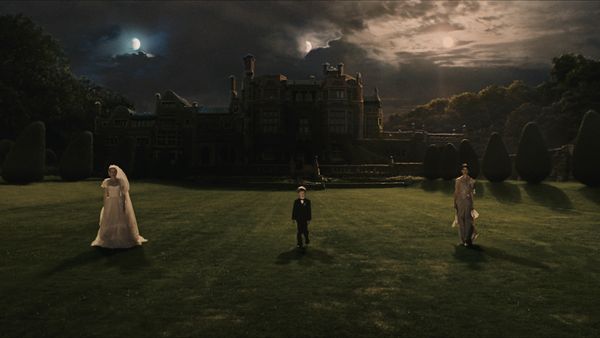Eye For Film >> Movies >> Melancholia (2011) Film Review
Melancholia
Reviewed by: David Graham

As a top-lining director, Lars von Trier's reputation as a provocateur can often overshadow his films; sometimes his shock tactics seem calculated to paper over the button-pushing cracks in his typically divisive output. While it's been refreshing to see him tackle different genres over the years - marrying his fraught drama with the musical for Dancer In The Dark, channeling supernatural chills for Kingdom Hospital and digging deep into psychological horror for Anitchrist - his own inimitable style and worldview always distinguishes his films from the crowd.
Melancholia plays like something of a LvT 'greatest hits', with its themes and characters familiar echoes from much of the director's oeuvre. Scaling back the epic scope of apocalyptic cinema just as much as he's dialing down the shock factor of his previous work, the result is an occasionally fascinating but generally alienating study of clinical depression and reactionary panic.

An arrestingly beautiful - if predictably pretentious - opening sequence details what might be the characters' dreams and nightmares of their imminent end. Justine's have the air of a wondrous fantasy; lightning tickles her finger-tips, and we see her decked out Ophelia-like in her half-submerged wedding dress. Her sister Claire's visions take on a tone of surreal portent, as she sinks into her bourgeois surroundings while desperately trying to shield her son from the crumbling world.
One spectacular image sums up the film pretty neatly, with the three characters lined up on the lawn, Justine under the deadly alien planet while Claire lingers under a nurturing sunset, her son Leo caught in the middle. The almost imperceptibly animated tableaux last longer than is perhaps necessary, recalling the gratuitous slo-mo thrusting shots of Antichrist's black-and-white opening, but they definitely combine with Wagner's bombastic classical music to prime the audience for an artier take on the end-times.
From here von Trier introduces us to Justine through an uncharacteristic moment of light humour, as her wedding limousine struggles to squeeze round the country road leading to her sister's palatial mansion, where the reception is due to be held. It's a nicely under-played moment, gently hinting at the awkwardness that will follow, even if Von Trier perversely milks it for more comedy than it's worth.
A painfully protracted and expectation-laden party follows, where the two sisters clash with each other, their family and the guests; their interactions are revealing and intriguing, in terms of the characters' relationships as well as their individual, internalised reactions to the potential disaster hanging over their heads. The planet is variously a source of abject terror, scientific fascination and misanthropy-affirming futility for Claire, her husband John (Kiefer Sutherland) and Justine respectively, each struggling to comprehend the other's perspective.
The problem with Melancholia is that each of these characters is so entrenched in their particular outlook that it becomes difficult to relate to any of them, especially as they come increasingly into conflict with one another. Justine and Claire grow tiresome pretty quickly, the former's issues being far too vague to be tangible while the latter's petty concerns over the expense of the wedding only make you wish the planet would hurry up and hit already. There's one darkly uncomfortable scene towards the end where the more superficially adjusted Claire seeks a disgusted Justine's advice and approval in suicide planning, but otherwise much of their relationship is a chore to sit through, both characters being ultimately one-note creations.
In the film's most poignant touches, von Trier makes an argument for the truest way of seeing the gravity of this situation being through the eyes of a child. All the science and rationalisation in the world - and therefore John's education and achievements - seem impotent next to Leo's makeshift plaything, a coil of wire through which the characters try to reassure themselves that the planet isn't getting closer. These sentiments of adult helplessness are echoed in the film's denouement, while ambiguous touches throughout the film hint at greater earth-bound forces than they can comprehend. It's suggested that Justine has some kind of psychic gift (her horse refusing to carry her over water might even hint at her being a witch), while the mystery of what she wants to talk to her father about keeps the wedding charged with intrigue.
Unfortunately, her nihilistic assertions elsewhere that life is 'evil' have all the weight of a spoiled teen who's listened to one too many Marilyn Manson albums. Many talented performers turn up in minor roles - John Hurt and Charlotte Rampling are the dysfunctional parents, LvT stalwart Stellan Skarsgard is Justine's admiring but pressurizing boss, while Udo Kier minces about like a David Lynch weirdie as a flamboyantly disrespectful wedding planner, disgusted at Justine's perceived ruining of his efforts - but almost all of them play deeply disagreeable characters who come across like petulant children.
Alexander Skarsgard is too wet and passive to be sympathetic as Justine's groom, while Brady Corbet turns up for no other reason than to be practically raped. At its core, Dunst, Gainsbourg and Sutherland give decent performances but they're a little too poised, too affected; none of them are especially believable as human beings, two hours in their company becoming frankly exhausting and exasperating.
In many ways Melancholia recalls Tree Of Life, with its visual majesty, ponderous air of doom and slow-burning ennui. Despite the admirable challenge von Trier has set for himself - tackling the apocalypse from one location with only a handful of players - it's ultimately an underwhelming experience, overlong and dramatically flaccid. His take on depression is too artfully distanced from his characters' actual feelings to generate any empathy for them in the viewer, while his undeniably pretty visual style isn't enough to elevate the bog-standard sci-fi scenario. Melancholia will no doubt impress von Trier die-hards, but everyone else should approach with caution.
Reviewed on: 30 Sep 2011



















